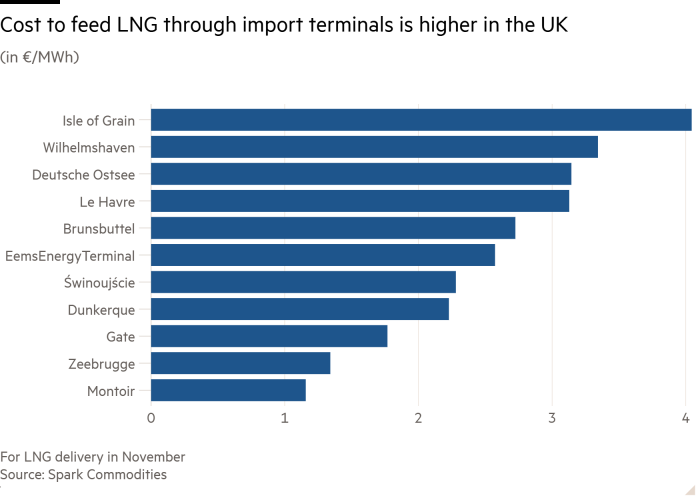Stay informed with free updates
Simply sign up to the UK energy myFT Digest — delivered directly to your inbox.
The UK is paying a much higher price for natural gas than continental Europe, as it tries to outbid its neighbours for limited supplies heading into the winter.
The UK’s gas price for delivery the next day rose to more than €1.6 per megawatt hour above the European benchmark in recent days, according to data assessed by Argus Media, while prices for delivery next month reached €1.5/MWh higher than Europe. Both levels mark the widest points relative to Europe since late 2021 — when Russia began reducing the amount of pipeline gas it sent — although the gaps have since narrowed slightly.
The price difference has been exacerbated by structural problems in the UK’s gas system such as high transmission costs and a lack of storage. This, coupled with a shortage of available liquefied natural gas globally, means the UK is having to offer a much higher price to try to secure the supplies it needs.
Analysts warn that the premium over European prices could rise even higher if this winter is colder than usual.
“Now that colder weather is setting in, driving up households’ gas use, the UK must compete with EU markets for available LNG and pipeline gas supply,” said Natasha Fielding, head of European gas pricing at Argus Media, a pricing agency.
The large UK premium is “to attract enough gas in the context of rising demand and low overall LNG supply in Europe”, she added.
While storage facilities in Europe are almost full, that is not sufficient to meet Europe’s winter needs, meaning it still needs to continue importing pipeline gas and LNG, putting it into competition with the UK to attract supplies.
UK gas prices have historically traded at a discount to European prices during the summer, but at a premium in winter when it imports gas from the continent as well as LNG from further afield, and when its structural problems tend to show up more.
In the case of a very cold winter, the premium that the UK gas market offers may need to be a lot higher to attract supplies, in part because of the country’s gas infrastructure.
One issue is the lack of gas storage capacity in the UK compared with Europe. Storage acts as an important buffer during the winter, but the UK can store only a maximum of 3.1bn cubic metres of gas, meaning demand has to be primarily met with imports. In contrast, countries such as Germany, France and Italy have a maximum capacity of between 15 and 25bn cubic metres, reducing their dependency on imports. European states are also interconnected with a vast network of pipelines, allowing flexible supplies between countries.
About half of Britain’s gas needs are currently met by imports, and National Gas, which owns the country’s main transmission network, expects more than 60 per cent of the UK’s gas to come from imports this winter.
Traders say the UK’s high transmission fees — variable tariffs paid by gas suppliers to transport gas through pipelines — could hinder the country’s ability to draw in gas, for instance LNG cargoes, when needed.
“A trader will only take variable costs into account when delivering spot LNG cargoes — avoiding the UK unless there is no other market available” to unload the LNG, said a trader.
“High transmission charges in the UK versus Europe act as a barrier to marginal LNG imports, despite the UK’s increasing reliance on uncontracted volumes to meet gas demand.”

Spark Commodities, a data firm, said the cost to deliver LNG, turn it back into gas and then feed it into the UK gas pipelines via the Isle of Grain import terminal in Kent is “higher than all other continental north-west Europe terminals”. The cost for Isle of Grain for an LNG cargo delivery in November is €4/MWh, 70 per cent above the average of the other north-west European terminals.
A significant driver of the higher costs at the Isle of Grain is transmission. This represents the cost to enter the UK’s gas system and is highest in the whole of Europe, Spark said.
“Especially high transmission costs in the UK means that its gas must be priced at a significant premium to EU markets to attract enough supply when it gets cold, particularly if LNG supply is scarce,” said Argus’s Fielding.
“The UK must be at a big enough premium to competing north-west European markets to cover the extra transport costs and attract the marginal gas molecule.”










